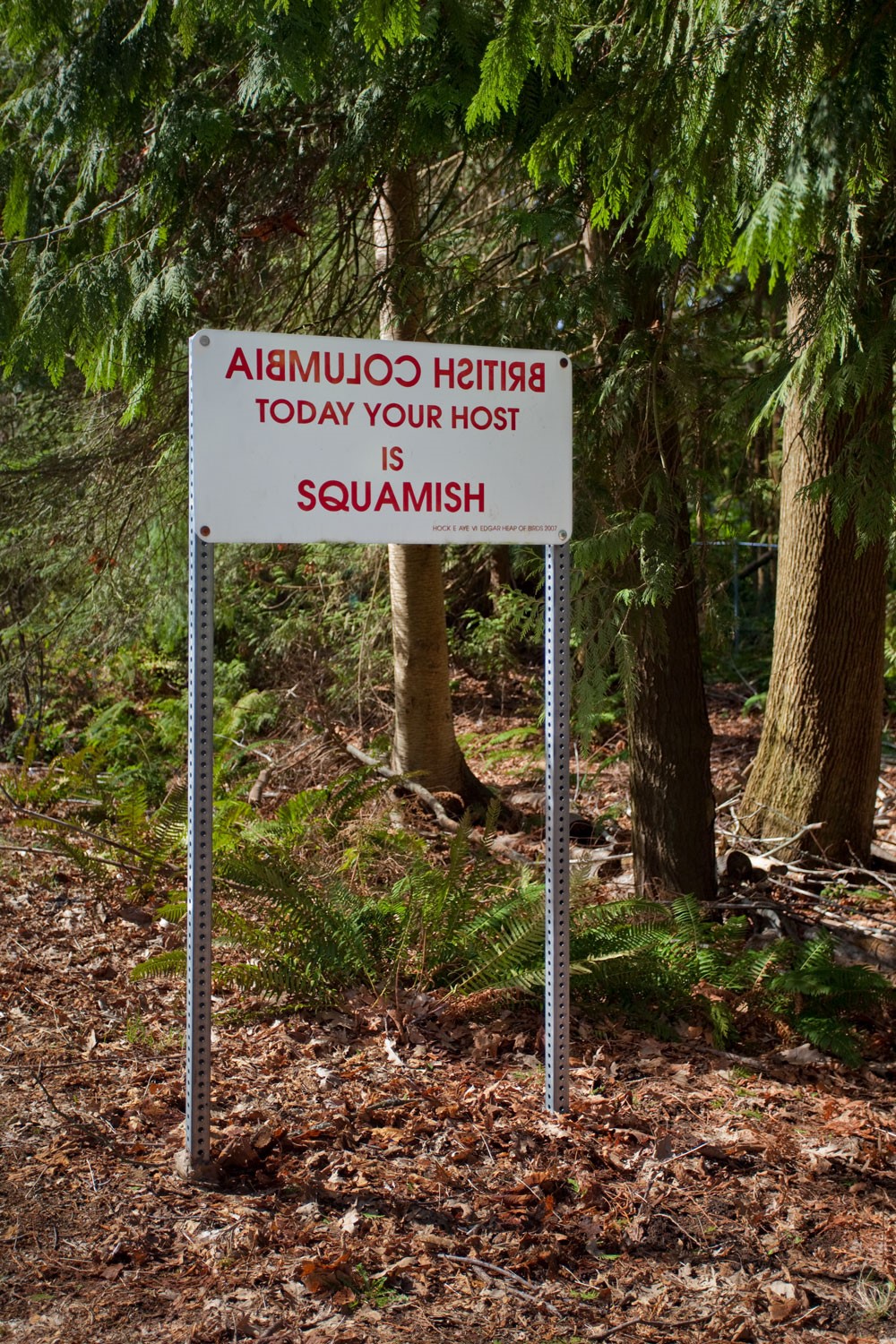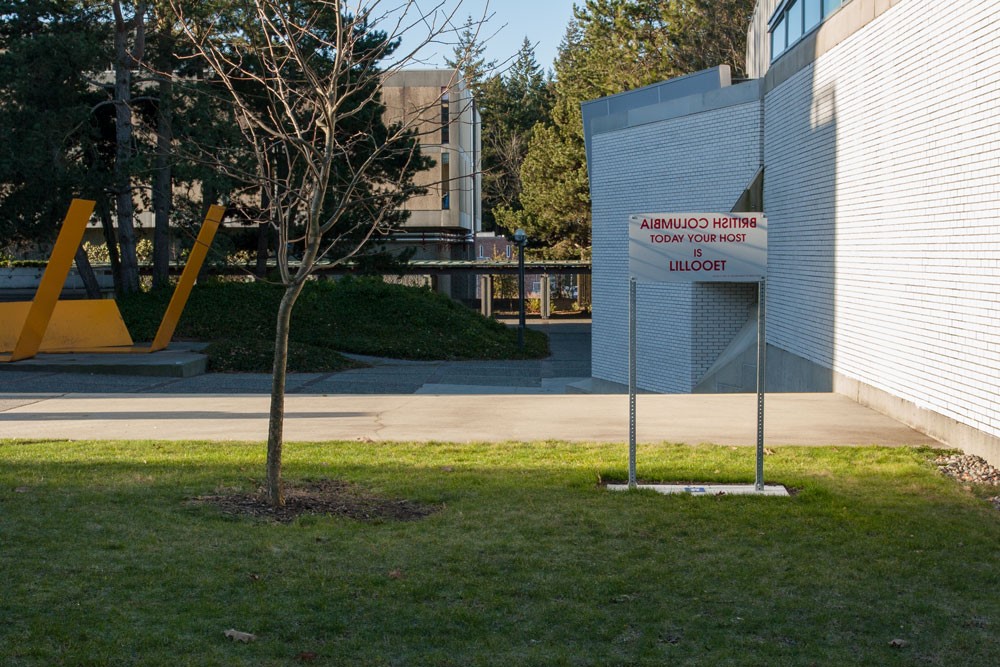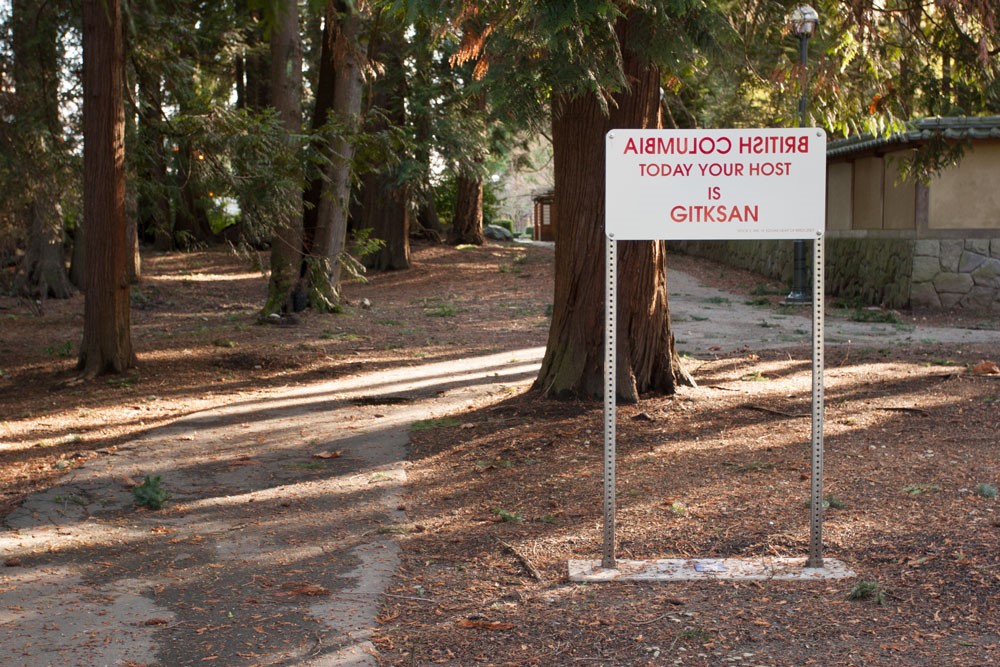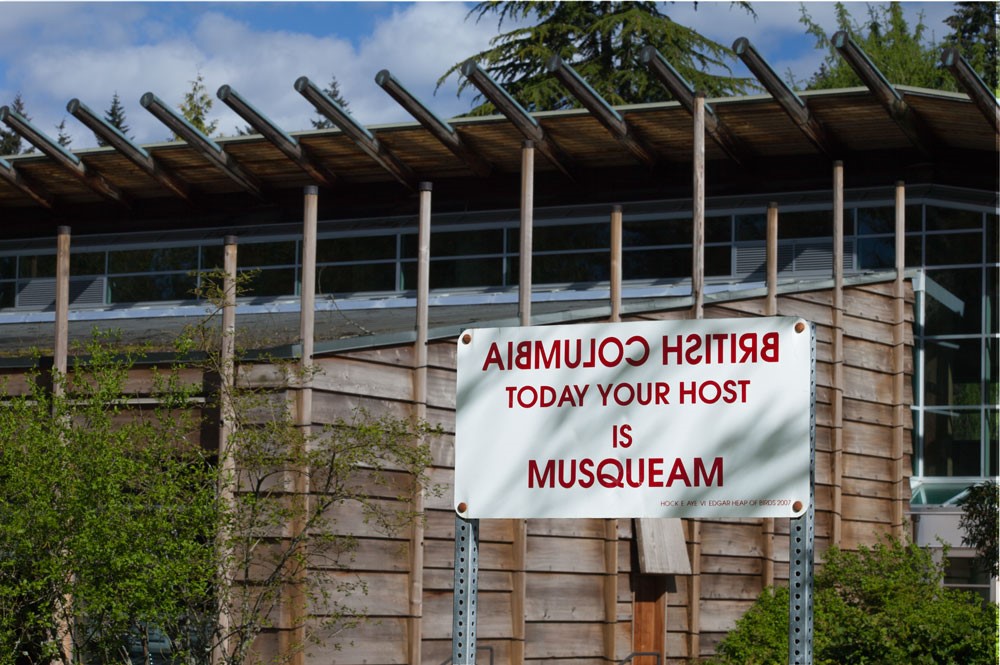In 2017, the Morris and Helen Belkin Art Gallery launched a new series of investigations considering the public realm of the UBC campus. To help understand and enrich the changing collection, they commissioned several video responses to selected works under the direction of filmmaker Ian Barbour, including Nisga’a writer and scholar Jordan Abel’s response to Hock E Aye VI Edgar Heap of Birds’s Native Hosts (1991/2007), a series of text-based works situated in multiple locations on campus. Resembling wayfinding signage, Native Hosts reverses the words “British Columbia” and inserts the names of twelve BC First Nations as hosts of provincial occupation. Heap of Birds’s work is reproduced here, with permission of the Belkin Art Gallery, along with Abel’s text response, which also appears in Issue 3.33 (Fall 2017).
Today your hosts are the high and countless summits. Today your hosts are the people. Today your hosts are the inclines and the hills and the approaching morning. Today your hosts are the miles of water and the shores of the lakes and the water beyond the water. Today your hosts are the great distances. Today your hosts are the headlands and the dotted islands and the light and the wooded forests and the beaten pathways and the stretches of shores and the cheerful voices and the black rocks and the open heavens and the narrow passageways and the steep, rugged ascent. Today your hosts are the people. Today your host is the air. Today your host is the community. Today your host is the wilderness. Today your host is the scent of roses. Today your hosts are the glimpses of mountain ranges that disappear just as suddenly as they appear. Today your hosts are the people. Today your hosts are the clear sheets of water and the forests and the islets and the rocks and the driftwood and the crevices and the fissures and the deep parts of the river. Today your hosts are the people. Today your hosts are the sounds. Today your hosts are the rocks. Today your hosts are the rocks and logs and mounds of earth. Today your hosts are the people. Today your hosts are the moments. Today your hosts are the adjacent lakes. Today your hosts are the bottom land and little ponds and drifts of sounds. Today your hosts are the people. Today your hosts are the people. Today your hosts are the people. Today your hosts are the people. Today your hosts are the people. Today your hosts are the people.
Today your hosts are the people. Today your host is the puncture. Today your host is the backwards. Today your host is the investigation. Today your host is the colonial. Today your host is the nation. Today your hosts are the thought and the thinking and the wondering. Today your host is the puncture. Today your host is resurgence. Today your host is Indigenous knowledge. Today your hosts are the unceded territories. Today your hosts are the people.
Today your hosts are the people. From the woods. From the broken masses of rock. From the distant western hills. From the veil. From the south.
Today your hosts are the people. From the western shores that are barely visible in the heat of the afternoon. From the northern end. From mountain to mountain. From the western bank of the lake. From eye. From body. From witness.
Today your hosts are the people. From the fire that sees itself. From the dizzying heights. From the narrow sheets. From truth.
Today your hosts are the people. From speaking. From flame. From the air pouring across the waters.
Today your hosts are the people. From light. From margin. From earth. From broken summits and broken sky. From the tumbling in the air a mile above us.
A mile above there is a tumbling; there is a moment. At this very moment there is a tumbling in the air a mile above us that runs straight through the open heavens and into some other place. A deep hollow. No shape. No consistency. No breaking some hundred feet in the air. Some places are softer than others. Some hundred feet up in the air. Some right angles enter into narrow passageways and some right angles break off a mile in the air above us. These rocks are full of cracks. Water has worked through some deep hollows. Breaking here. Wearing there. Breaking and wearing until the chasm separates into two caverns. Some hundred feet in the air there is no danger. There is scattered driftwood and the scent of roses. There are glimpses of roses and rocks and shrubs. There is a steep, rugged ascent. A path that winds among the black rocks and trees. Somewhere in the air there is the scent of roses. Somewhere out there is the wilderness. A reasonable distance through scenes of greenery and nature and glimpses of mountain ranges that disappear just as suddenly as they appear. Among the rocks and trees there are mounds of earth and other rocks and other driftwood. Somewhere there is an islet and another islet and a clear sheet of water and bald rocks just beneath the surface. There are forests and straits and islets and rocks and somewhere in the air is the scent of roses. There are crevices and fissures and rocks. The rocks surround themselves in other rocks. Although there are sometimes mounds of earth in between. On the shore, there are fragments of rocks. In the deeper parts of the river, there is more tumbling. At this very moment, the river pours into a wide fissure where it just becomes more water between rocks. Between the broken rocks and the deep, roaring cavern there is the scent of roses and driftwood and trees. There is light and straight, naked rocks and immovable trees. There are woods and rivers. And the bed of that river is ragged with rocks and intersecting ravines that cut silently across the water above where somewhere in the air is the scent of roses. The woods are full of sounds and rocks and trees. The woods are full. The upper air, where it drifts over the tops of trees, is full of sounds. Just where it breaks over the tops of trees there are slow, intermingling drifts of sounds and scents that brush over the clearing some fifty or sixty feet up in the air. Today your hosts are the people.





